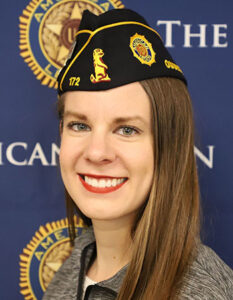Veterans win some and lose some during 2024 Legislature

ST. PAUL — It was the best of times. It was the worst of times.
The 2024 Minnesota Legislature had its ups and downs, from when gambling charities thought they might finally see long-promised tax relief, to the end of session, when it went “poof.”
There was the good news of funding for the operations of three new veterans homes, and the heartbreak from the failure to pass increased property-tax breaks for disabled veterans.
Get ready to read the rollercoaster:
Charitable gambling tax relief goes up in smoke
The sports-betting bill that would have provided meaningful tax breaks for charitable gambling for all licensed charities across the state did not make it to the finish line in the 2024 session.

It cleared seven House committees, including the House Ways & Means Committee on May 10. Then it awaited a hearing on the House floor on May 15. It never came. Advocates were hoping it could reach a conference committee. It was rescheduled for May 17. Again, no hearing.
What happened? The belief is the House leadership didn’t think it had enough votes, so they declined to bring it for a floor vote.
Tax breaks for charitable gambling was a major push for The American Legion Department of Minnesota this past session because revenue from charitable gambling is crucial in efforts to assist veterans, bolster veterans programs and strengthen communities.
“Sports betting is not going to happen this year,” said American Legion Legislative Chairwoman Kristy Janigo, who watched the proceedings from the Senate Gallery at the State Capitol. “We put in some valiant effort including some last-ditch things the past few hours. We won’t have our charitable gambling tax cuts. Next year we need to watch our numbers closely to assess how much the e-tab changes affect our revenues.”
In the 2023 session, the Minnesota Legislature scaled back electronic pulltabs by banning bonus games, free plays and the open-all button, under an argument that they were too close to tribal casino slots. E-tab supporters point out slots have jackpots, variable prize structures and unlimited bets, far from resembling e-tabs.
Janigo and many others within The American Legion and Allied Charities of Minnesota fear the changes will make e-tabs less entertaining, thus harming e-tab revenue. The changes go into effect in January 2025 — noticeably after the November elections.
The sports betting bill, if approved, would have provided relief for charitable gambling estimated to be $7 million the first year, $24 million the second and $40 million onward. It included language to allow posts to use more of their net receipts to fix their buildings.
The impression made in one session often translates over to the next. Janigo hopes the tax cuts can be accomplished in the 2025 session.
Veterans and Military Omnibus remains undefeated
It was the third year in a row that the Legislature passed the Veterans and Military Omnibus Bill, removing most of the veteran-related legislation from partisan politics. It also was the third year the bill was passed about two weeks prior to the end of the session.
Gov. Tim Walz signed it into law May 8.
The new law allows counties to fund Veterans Day observances just like they do for Memorial Day ceremonies, and it removes a $300 cap. It lays the groundwork for a fourth State Veterans Cemetery, to be in the Bemidji area. It allows county veteran service officers and VSO service officer to receive discharge papers and vital records from county records at no charge. It codifies the Minnesota Department of Veterans Affairs’ Central Pharmacy for the veterans homes. It aligns admin staffing structure within the MDVA. It allows a grant for Metro Meals on Wheels to use this fiscal year’s funds next year.
The bill increases the biennium spending by $132.15 million, totaling $378.68 million. That’s $90.06 million for the Minnesota Department of Veterans Affairs and $39.14 million for the Minnesota Department of Military Affairs.
The bill provides a $33.23 million operating adjustment for the MDVA, $20.06 million in operational funding for the veterans homes opening in Bemidji, Montevideo and Preston, $17.6 million for the Army Combat Fitness Test Field House in Arden Hills, $15 million for service bonuses to post-9/11 veterans, $7 million to increase Minnesota Assistance Council for Veterans housing grants and $3 million in enlistment and retention bonuses.
Lawmakers disable property-tax relief for disabled veterans
With rising home values, the Legion, DAV and other Minnesota Commanders’ Task Force organizations, felt it was time to alter the property-tax exclusions veterans with a VA disability rating of 70 percent or more receive (or surviving spouses).
As part of the Homestead Market Value Exclusion, it allows veterans with a service-connected disability of 70 percent to receive a $150,000 exclusion to their assessment, and veterans with 100 percent receive a $300,000 exclusion.
The 2024 bill called for an exclusion base amount for 2023 to be $400,000 and, thereafter, to be adjusted for housing market adjustments based on U.S. Department of Commerce annual reports.
The bill also allows qualifying spouses who previously were denied to apply again, even if the veteran had not applied prior to death.
In 2020, Minnesota passed a law ending the eight-year sunset for surviving spouses to receive the tax benefit. Importantly, the new bill would have allowed the spouses whose benefit expired prior to the 2020 law to reapply.
After debate on the House floor, the language was amended into the Tax Omnibus Bill on a 128-0 vote. There was no corresponding Senate version when the two chambers met in conference committee, which ended up going behind closed doors.
When the dust settled and the compromise announced, only about an hour before the gavel dropped for the end of the session, the language had been stripped out, said DAV of Minnesota Legislative Director Trent Dilks, who watched the whole thing play out.
He said it didn’t really die because of party politics. It was the House in favor and the Senate not.
Veterans Restorative Justice Act wants some numbers
In 2021, Minnesota passed the Veterans Restorative Justice Act. The bill had bipartisan authors and, though it had faced much debate over five years and had unexpected opponents, it was approved with bipartisan support and signed into law on a sunny June day.
Primarily, the bill allows access to veterans courts for veterans before a judge in counties without veterans courts. It sets uniformity among the veterans courts and determines eligibility. Veterans courts restore veterans to society who have committed lower criminal offenses, rather than leaving them with criminal records for what could be someone dealing with unseen wounds of combat. There are several probationary steps, but one upside is the court typically requires the veteran to get the proper VA counseling, not merely general counseling.
The Minnesota American Legion had a major role in pushing for passage of the VJRA by keeping the topic alive.
In 2023, the Legislature approved a technical fix, and the governor signed it. The change allows veterans charged with a crime to find out whether they are eligible for deferred prosecution before entering a plea or going to trial. They may request an eligibility assessment first.
In 2024, the Legislature approved, with the governor signing, requiring courts that use VRJA to provide results to the Sentencing Guidelines Commission, which then will produce an annual report by Jan. 15.
Attorney Ryan Else of the Veterans Defense Project said this helps the VDP bring the legislation to other states. Lawmakers often desire numbers, not merely anecdotes.
The Nebraska Legislature unanimously passed its veterans justice program based on Minnesota’s and with input from the independent Council on Criminal Justice, with Gov. Jim Pillen signing it in April. The American Legislative Exchange Council, a nonprofit organization of conservative state legislators and private citizens that drafts proposed legislation, adopted the legislation as part of its Criminal Justice Task Force Model this past spring, too.
“We are moving,” Else said, regarding bringing it to other states. “It’s happening. It’s just happening slower than we’d like.”
Former U.S. Defense Secretary Chuck Hagel is from Nebraska and has stated his strong support for the legislation in news reports. Else and Veterans Defense Project attorney Brock Hunter were advisers to a commission in Nebraska that drafted the legislation.
Disabled veterans ready to visit Minnesota Arboretum
Mike Schachterle, a member of Chanhassen Post 580, had a really good idea and brought it to Minnesota American Legion Legislative Chairwoman Kristy Janigo and to state Rep. Lucy Rehm. Together, they advocated for a law to provide free admission to the Minnesota Landscape Arboretum for disabled veterans.
The measure passed as part of the Omnibus Tax Bill. The new law requires that the disabled veteran provide an ID card verifying the disability is service-connected. It went into effect May 25.
Minnesota to launch Purple Star Schools
An effort led by state Rep. Peggy Bennett of Albert Lea, Purple Star Schools are now in Minnesota. It passed within the Education Omnibus Bill.
Schools designated “Purple Star Schools” demonstrate to military families that they are military-friendly. Military children move every two or three years. Some schools are ahead of their progress, so the kids need to catch up, and some schools are behind, so they relearn lessons.
“Sometimes it is difficult for my teachers to understand my struggles,” said Genevieve LaPorte, 12, whose father served in the Army her entire life. She testified before the House Veterans Affairs Committee. “Having extra support for these issues would be so helpful for many military kids who deal with the same thing that I do.”
“As our military members and their families move from state to state, providing for a smooth educational transition for their children is key to eliminating one of the largest concerns the parents face,” said Shane Preston, the Department of Defense’s liaison for state legislation regarding community and family in the Great Lakes area, when testifying.
The measure allows the Department of Education by July 1, 2026, to set up requirements to be designated a Purple Star Schools. Preston said among them are a staff member to act as a liaison between military families and the school and training for teachers to understand the challenges military-connected students face.
Minnesota becomes the 40th state to have Purple Star Schools. The public will begin to see the designations during the 2026-27 school year.
A fiscal note says the Department of Education already has assistant commissioner who supports military-connected students who will administer the program, with about $5,000 in expenses to get it rolling.
The Minnesota Commanders’ Task Force, at the urging of The American Legion, wrote a letter in support of Purple Star Schools.
No property-tax relief for veteran organizations
Many states do not charge property taxes on posts of The American Legion, VFW, Amvets and other congressionally charted organizations A. because members served to defend the country, and B. because they contribute so much to needs within local communities.
State Reps. Mark Wiens and Steve Elkins, along with 12 other authors from both parties, want the same for Minnesota. Their bill, HF4038, passed the House Veterans Affairs Committee but didn’t get a hearing. The Property Tax Committee chairman urged veterans to get behind the sports-betting bill isntead because it contained tax cuts for charitable gambling.
He reasoned posts with gambling licenses at their post homes can use proceeds to pay property taxes.
Not all posts possess gambling licenses, however.


